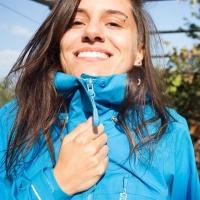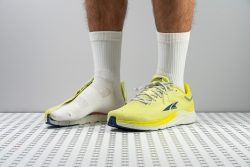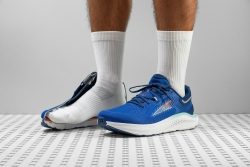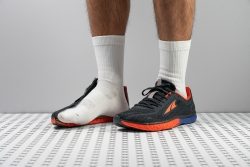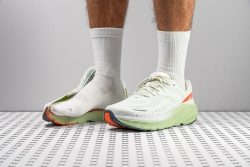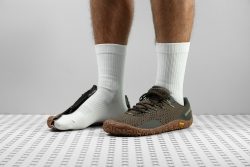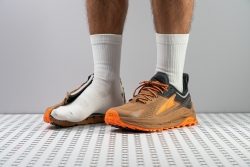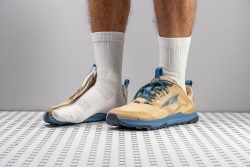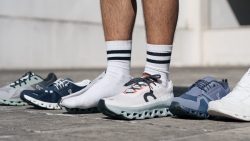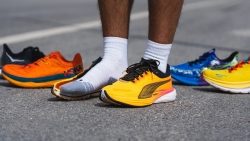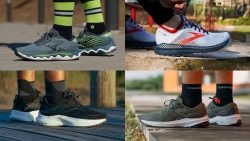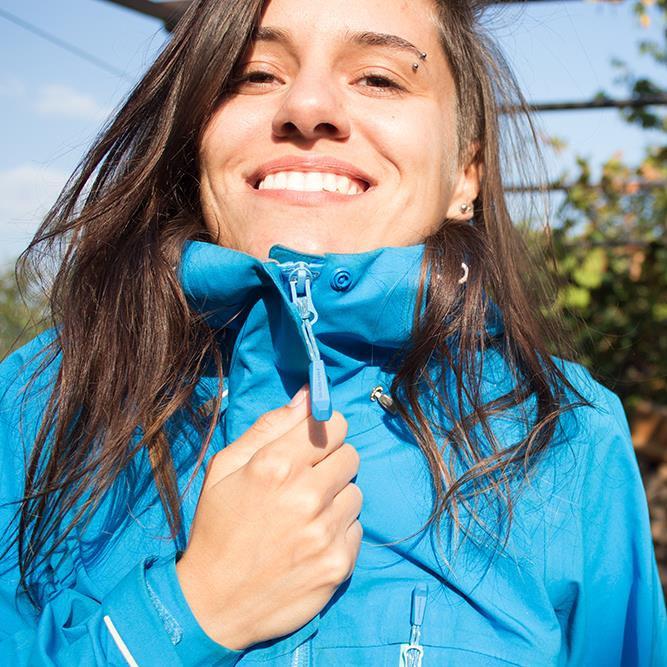7 Best Zero Drop Running Shoes in 2024
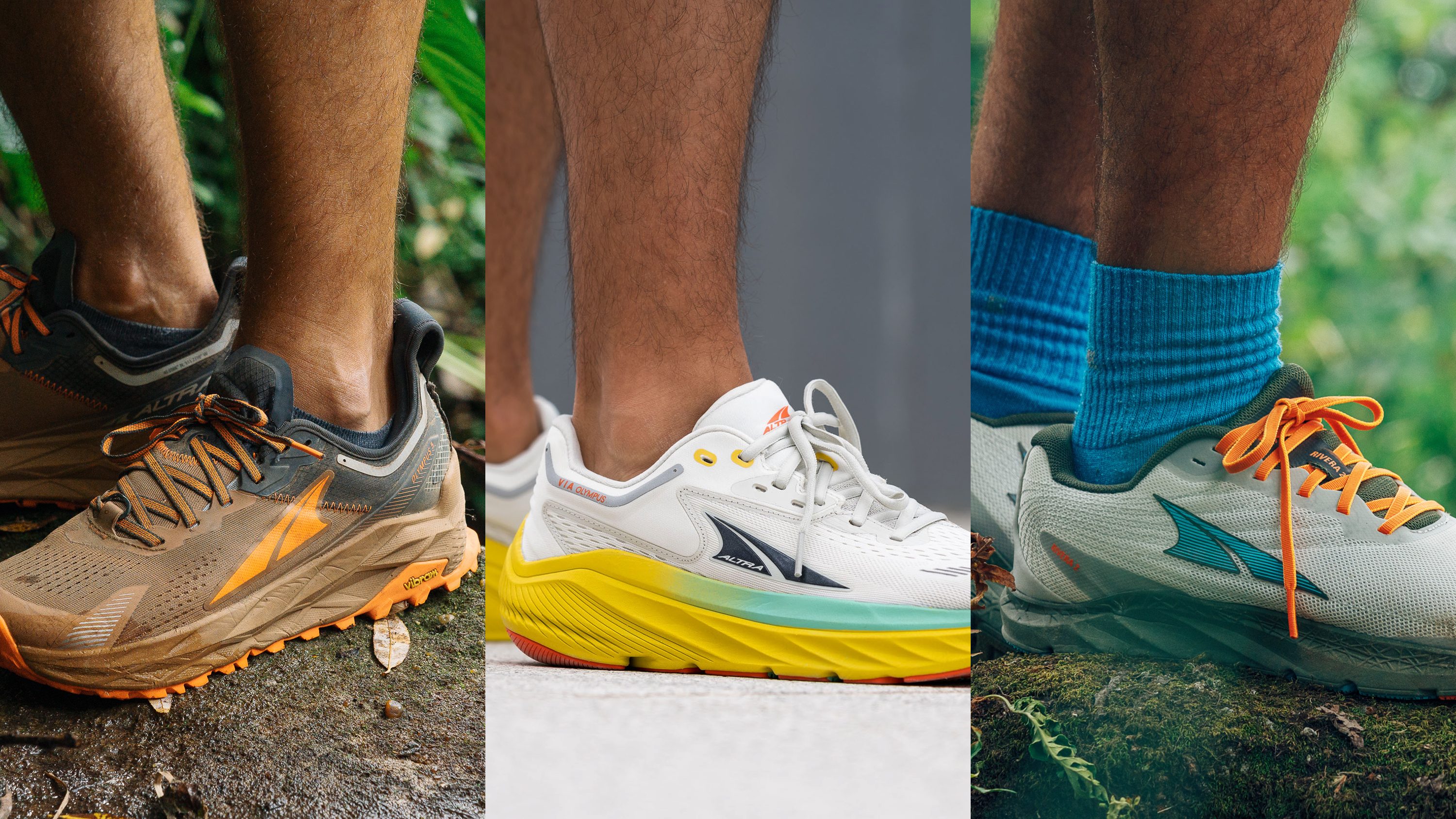
Running in zero-drop running shoes is great BUT under a few conditions: you know why you’re doing it and what to expect. Learn more in this guide so you can make an informed decision. Reading Born to run is simply not enough (but is highly motivating, yes!).
Though many associate zero drop with minimalism, that’s not necessarily the case. There are some well-cushioned Altra shoes that prove the opposite. Here, you will find our best of the best zero-drop shoes. Our lab measurements of the stack heights are especially interesting because, as it turned out, many shoes that were branded as zero-drop, turned out to be low-drop or even mid-drop!
If you’re not sure about which heel-to-toe drop you need and the effects it might have on your body and running, read our in-depth guide on the heel-to-toe drop.
How we test running shoes
We are a group of running fanatics and we do in-depth research. We created our RunRepeat testing lab to put every shoe through the wringer and pick out the best in various categories. Here is the process:
- We buy all reviewed shoes with our own money for transparency.
- We deliver feedback on shoes after we log 30-50 miles. We run, walk, and even do light workouts in these shoes.
- We cut every shoe into pieces to measure stack, drop, and 30+ other parameters.
The best-performing zero-drop shoes make it here.
Best zero-drop running shoes overall
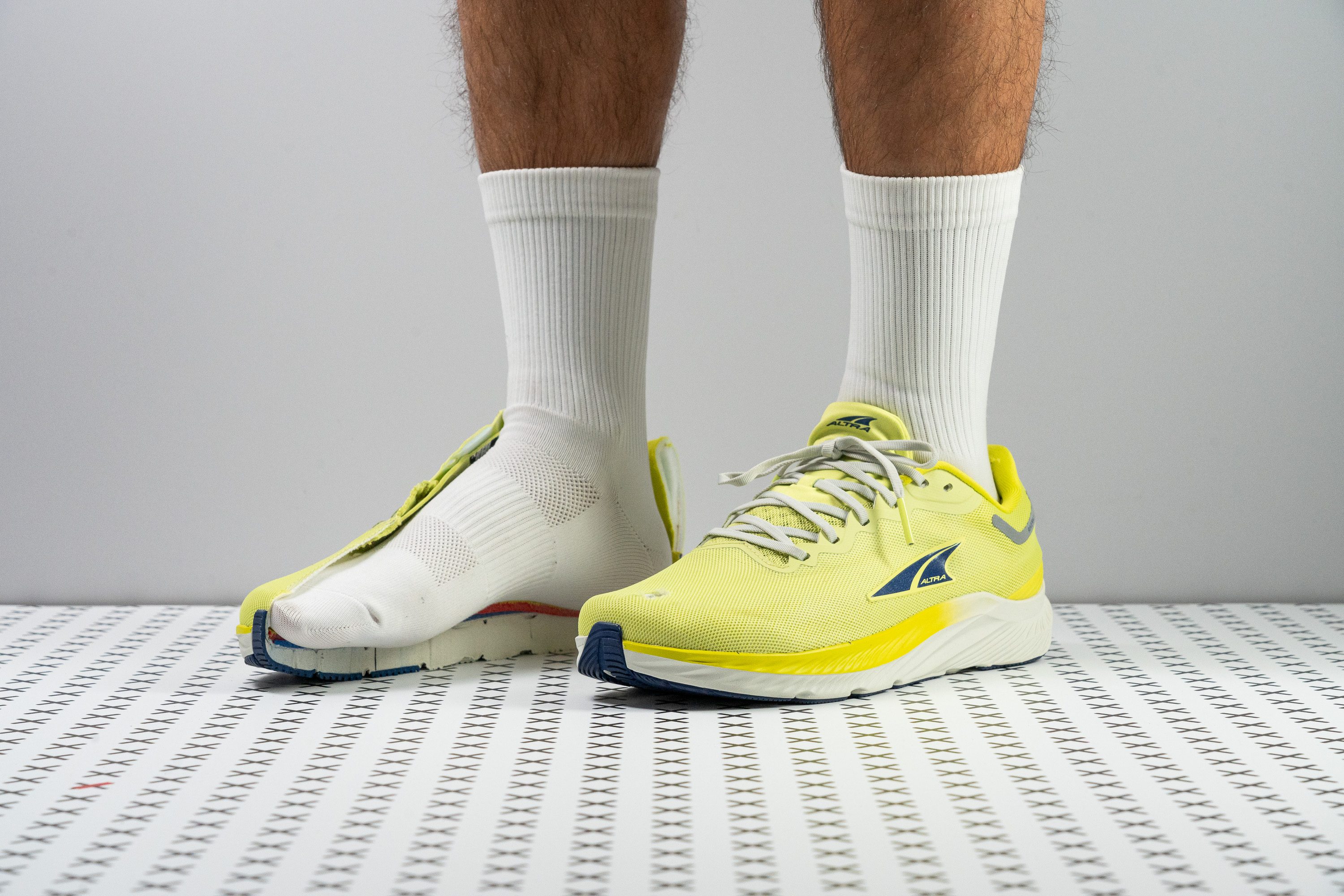













































What makes it the best?
Altra Rivera 3 is our top zero-drop running shoe because it gives us a natural yet energetic experience. Its cushioning serves the perfect mix of protection, ground feel, and comfort in our urban and off-road adventures. Our lab results coincide with all the wonderful experiences we had.
We identified two key factors behind the Rivera 3's barely-there feel: its minimal drop and adaptive midsole. Measuring just 1.7 mm, the heel drop almost disappears, offering a nearly flat experience. The platform's fluid motion complements our movements seamlessly, which our bend test confirms is 21.4% more flexible than average.
The midsole offers a dynamic yet forgiving ride, delivering ample cushioning for impact protection upon landing and energy return for our takeoffs. The modest 28.4/26.7 mm stack offers a good amount of surface feedback and magnifies the plush sensation through its velvet touch. Our durometer confirms it’s an incredible 34.2% softer than average. Despite this, we don’t sink into the foam and receive a lot of bounce to sustain our faster paces instead.
One complaint we have is that its laces frequently come undone during our runs due to their smooth texture. We recommend switching them out or double-tying them for added safety.
Pros
- Great for easy runs
- Superb comfort
- Plush cushioning
- Peppy and responsive
- Flexible and forgiving ride
- Unhindered and smooth strides
- Toebox easily accommodates wide feet
- Works great as a walking shoe
- Can go sockless
Cons
- Lockdown needs a lace lock
- Laces get untied easily
- Not great for speedwork
Best zero-drop daily running shoes
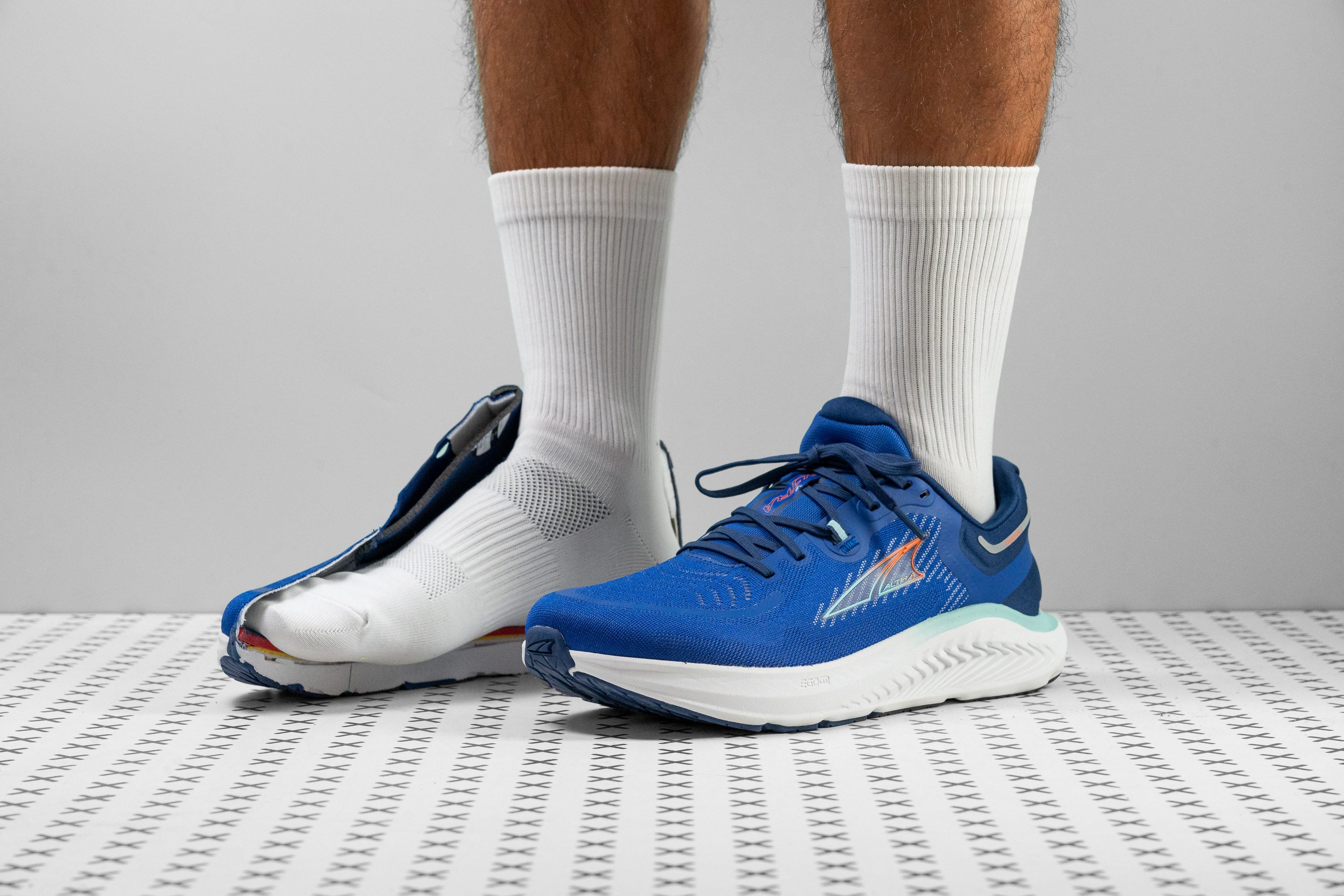







































What makes it the best?
Paradigm 7 shines as a light go-to pair that gives great ground feel, comfort, and flexibility to move around. It has some stability features for added support and is very accommodating for all-day wear. Our lab and run tests cement Paradigm 7 as our best daily trainer among zero-drop running shoes.
Paradigm 7 stays true to Altra’s zero-drop branding, with an almost non-existent 0.1 mm drop. Its 27.6/27.5 mm stack, combined with its Innerflex technology, makes it ideal for midfoot to forefoot strikers. This utilizes cuts in the midsole to allow the foot to flex naturally. Its flexible nature makes it easier to maneuver, emerging 28.9% more adaptive than average.
Even with its lower stack, the Ego Max cushioning feels comfy without being overly soft. This enhances stability because we don’t bottom out. Our durometer confirms its velvet touch, measuring 18.8% softer than average.
Paradigm 7 feels airy and fresh with its light 9.3 oz (264g) weight vs. the 9.5 oz (268g) average. Its upper contains large ventilation holes with a thin fabric underneath for comfort. On our breathability test, it scored an impressive 5/5.
This isn’t the best option for speed-running as it lacks the energy return to sustain fast paces.
Pros
- Exceptional space for toe splay
- Highly stable and supportive
- Really light
- Features Ego Max foam for added comfort
- Innerflex technology promotes natural midfoot striking
- Outstanding durability
- Versatile for walking or gym use
- Genuine zero-drop design!
Cons
- Becomes uncomfortably firm and stiff in cold weather
- Priced on the higher end of the spectrum at $170
- Not suitable for fast-paced running
Best zero-drop tempo/race running shoes
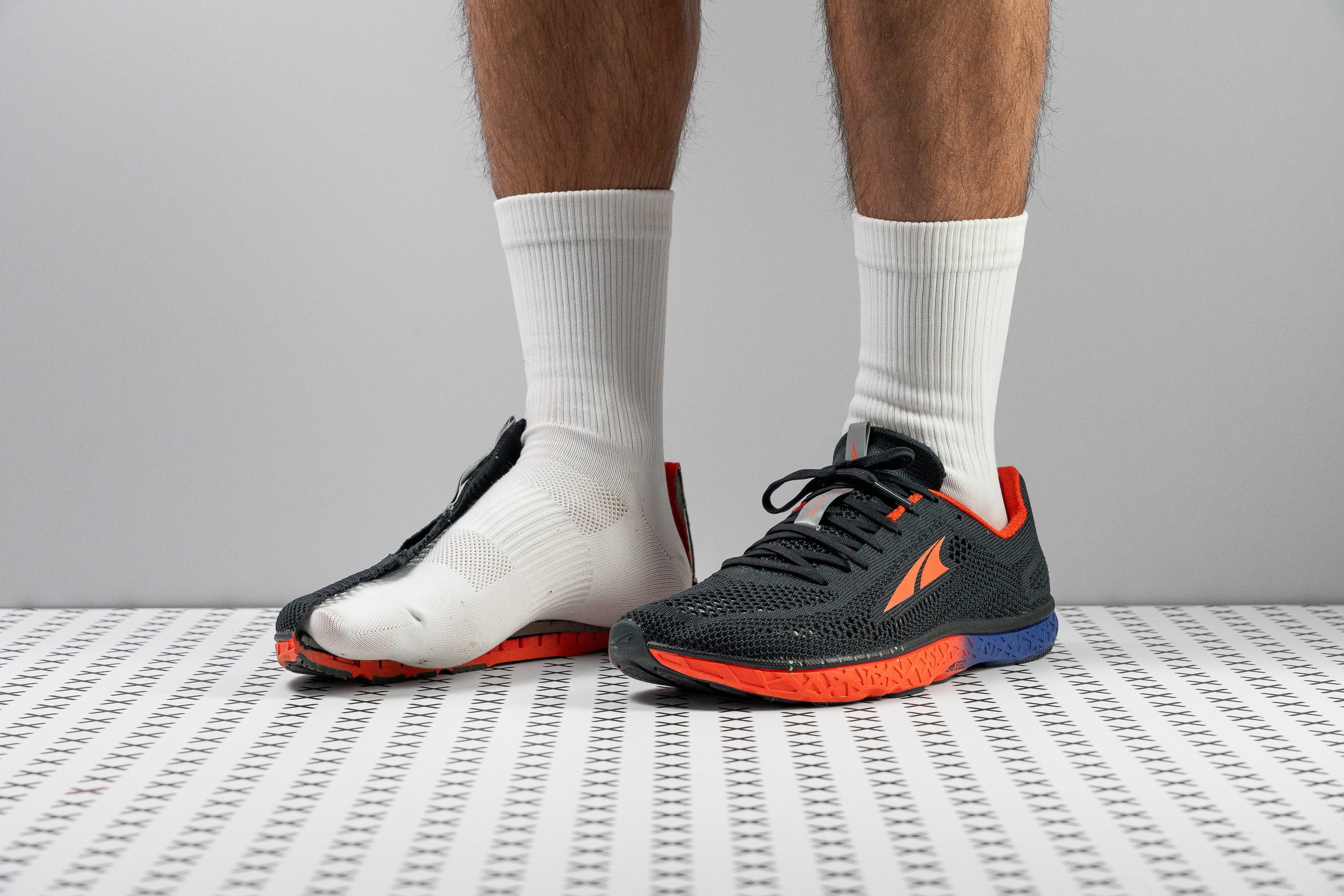














































What makes it the best?
Just by its name, we already know the Altra Escalante Racer has speed in its DNA. The streets and our lab further confirm it's the best tempo/race shoe among zero-drop running shoes. With its light, low, and loose build, it offers a grounded and energetic experience that’s great for building speed without the aid of rigid plates.
Light at just 7.3 oz (208g), Escalante Racer melts away with our feet as soon as we start running. Its lightweight design is attributed to its thin midsole, enhancing ground connection and agility.
Low drop and cushioning is what this speedster's all about. At 19.0/18.5 mm, its minimalist stack makes our legs do the work, which is great for building muscle strength and endurance. The almost-zero 0.5 mm deviation is barely noticeable, enhancing the barefoot experience.
Loose from all angles—Escalante Racer boasts of the FootPod technology in the outsole and the InnerFlex technology in the foam to ensure the shoe moves based on our natural motions. From forward bends to twists, the midsole barely resisted. Our lab results showcase an impressive 62.9% higher flexibility than average and the lowest 1/5 score for torsional rigidity, proving that speed and flexibility can go together.
However, its minimal cushioning may lack comfort for daily abuse and very long miles. We warn caution that the zero-drop ride takes time to get used to.
Pros
- Durable, breathable upper
- Exceptionally flexible
- Minimalist, natural ride
- Superior grip
- Spacious toebox
- Stable
- Really lightweight
- Authentic zero-drop design
Cons
- Minimal energy return
- Not the best for winter
- Non-gusseted tongue
Best zero-drop running shoes for long distance
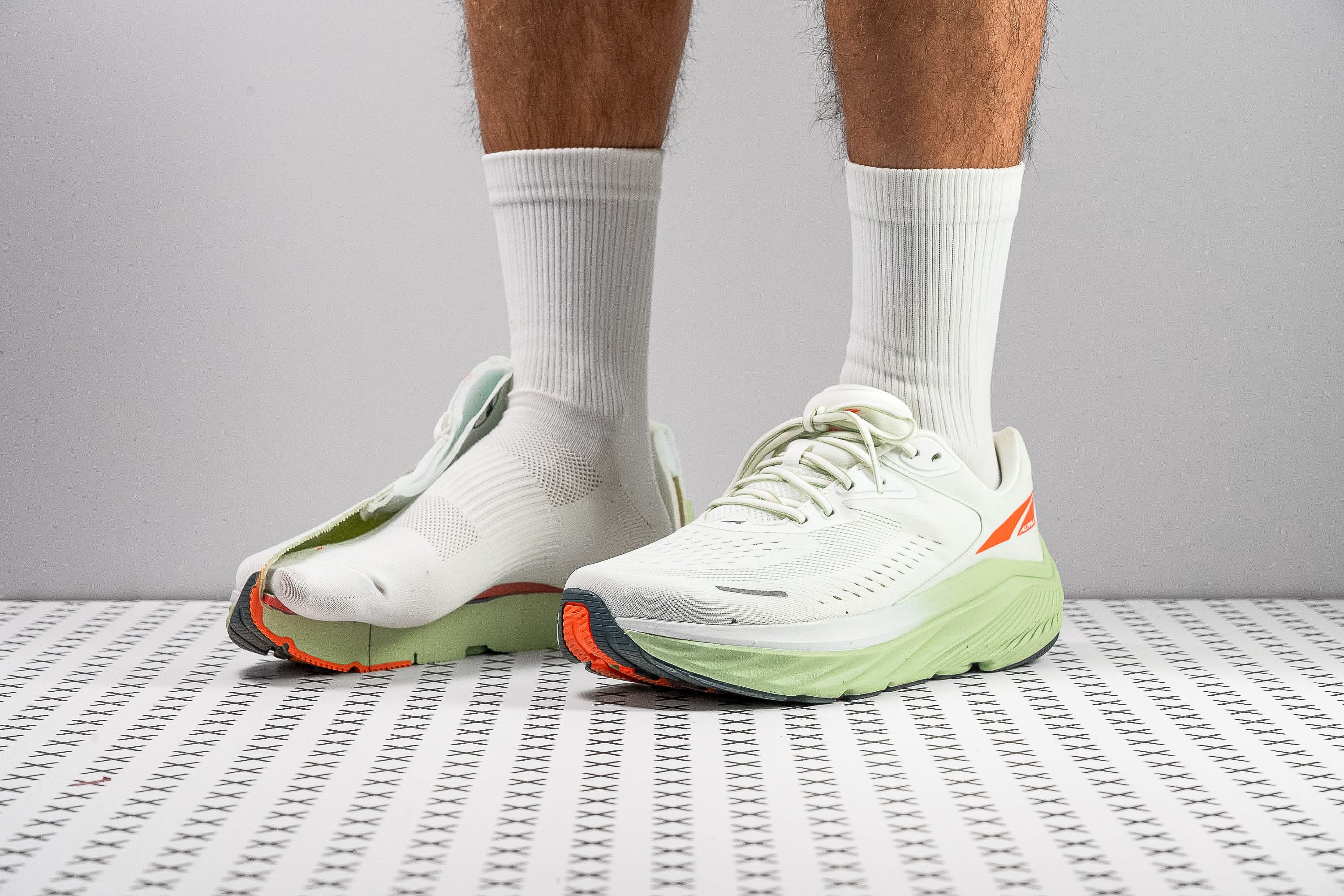


















































What makes it the best?
Among zero-drop running shoes we tested on foot and in the lab, Altra VIA Olympus 2 stands out as the best for long distance with its cushioned midsole offering a dynamic ride and its durable outsole surviving hundreds of miles. Not only that, it’s designed with intention, mirroring our natural foot shape for a more comfortable experience.
Made with EGO MAX foam, VO2 delivers a generously cushioned and responsive ride that feels more effortless in endurance runs. Our caliper reveals a tall 34.8 mm heel, and a staggering 35.0 mm forefoot, one of the tallest we’ve encountered in this area. This leads to a non-existent -0.2 mm drop, maintaining Altra’s zero-drop branding. With its plush foam, 32.2% softer than average, it infuses each stride with bounce and comfort.
The toebox boasts Altra’s FootShape design, mirroring the natural foot silhouette for unrestricted comfort. With a roomy 104.4 mm toebox tapering to 91.1 mm at the big toe, it accommodates foot swelling during long runs.
Even the outsole has the FootPod technology, with cuts that align with our foot anatomy. Though it measures softer than average, it shows 33.3% less wear in our Dremel test than average, proving it’s built to last.
However, VO2 offers limited ventilation, which may cause blisters and hotspots when running in hot weather. We recommend looking elsewhere if breathability is a priority.
Pros
- Incredibly roomy toebox
- Authentic zero-drop design
- Extremely cushy and soft midsole
- Superb all-around durability
- Cozy upper
- Remarkably stable
- Ideal for long runs
Cons
- Limited ventilation
- Tongue not gusseted
- Still a bit heavy
Best zero-drop minimalist running shoes
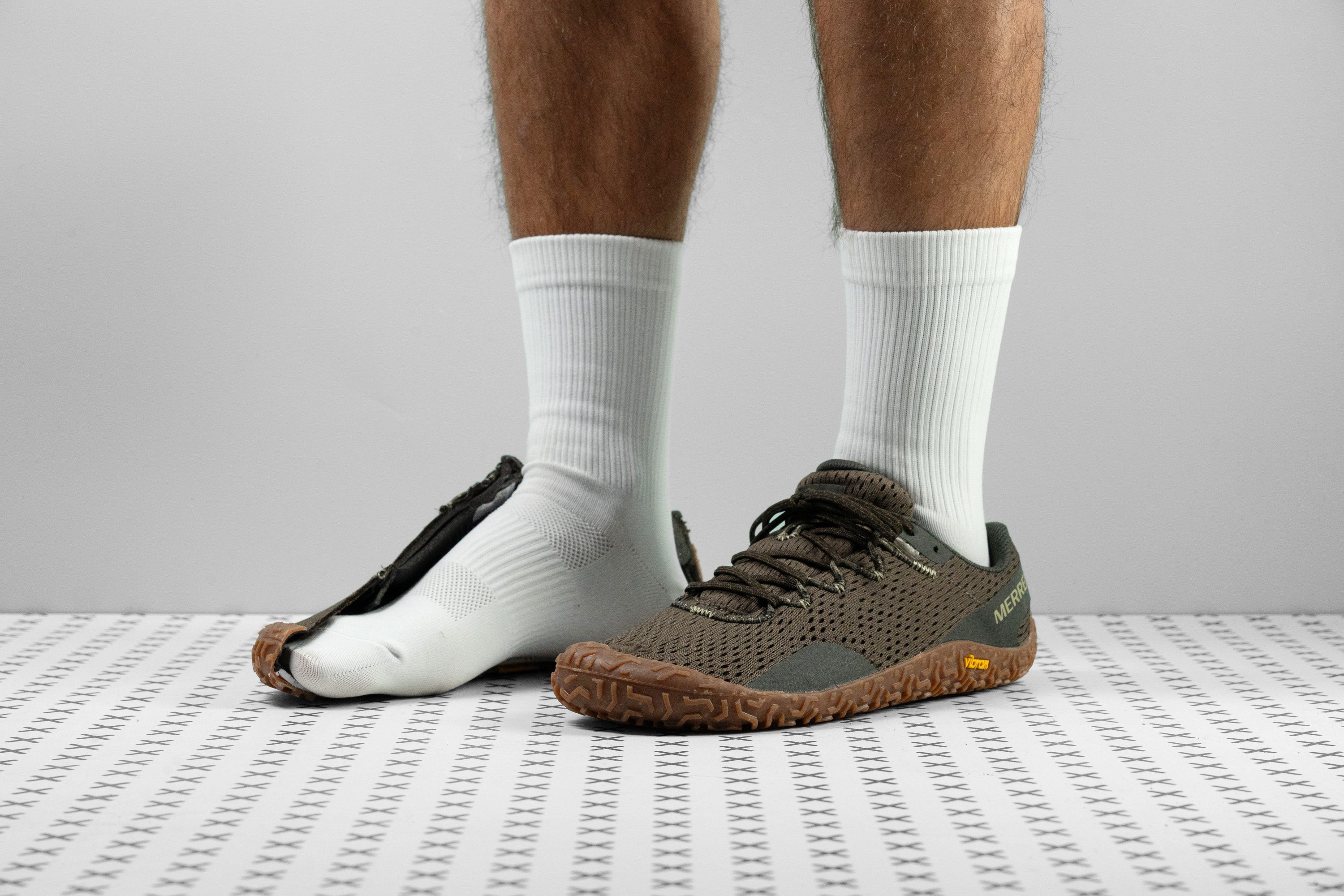









































What makes it the best?
Among zero-drop running shoes, Merrell Vapor Glove 6 stands out by perfectly encapsulating the essence of minimalism. Rigorous evaluations on foot and in the lab reveal it delivers an authentic experience through its flexible midsole, grounded feel, and dependable traction. Despite its exceptional performance, this shoe remains steadfastly minimalist, exemplified by its accessible price tag of only $90.
The shoe disappears on foot as we start running and our scales reveal why: it’s an almost weightless 5.6 oz (159g), boldly shaving off 40.2% from the average trail shoe’s build. Further enhancing its featherweight feel is the maneuverable midsole, which emerged a staggering 92.5% more flexible than average. It basically feels like there’s no resistance to bending with its 2.2N force result.
The light and loose build is the result of VG6 stripping away its cushioning. At a low and leveled 7.6 mm stack, it makes us highly sensitive to ground feel, allowing us to quickly adapt to unpredictable terrains. This shoe truly delivers the zero-drop experience and our precise measurements align.
Underfoot is the reliable Vibram outsole with an aggressive pattern to enhance grip. Staying consistent in our assessments, Vibram delivers unmatched traction on mixed terrains we tested.
Unfortunately, those with narrow feet will find the shoe overly spacious. These types of runners who prefer a glove-like fit can explore elsewhere.
Pros
- Accommodates wide feet comfortably
- Exceptional ground feel
- Fairly priced at $90
- Highly responsive and agile
- Extremely flexible design
- Ideal for those with wide feet
- Maintains grip, even on wet surfaces
- Sockless ready
- Perfect for road running or tackling easy trails
- Versatile enough for hiking, walking, or even gym workouts
Cons
- Overly spacious for those with narrow feet
- Outsole shows wear quickly
- The cushioned insole detracts from a true barefoot experience
Zero-drop running shoes with the best cushioning
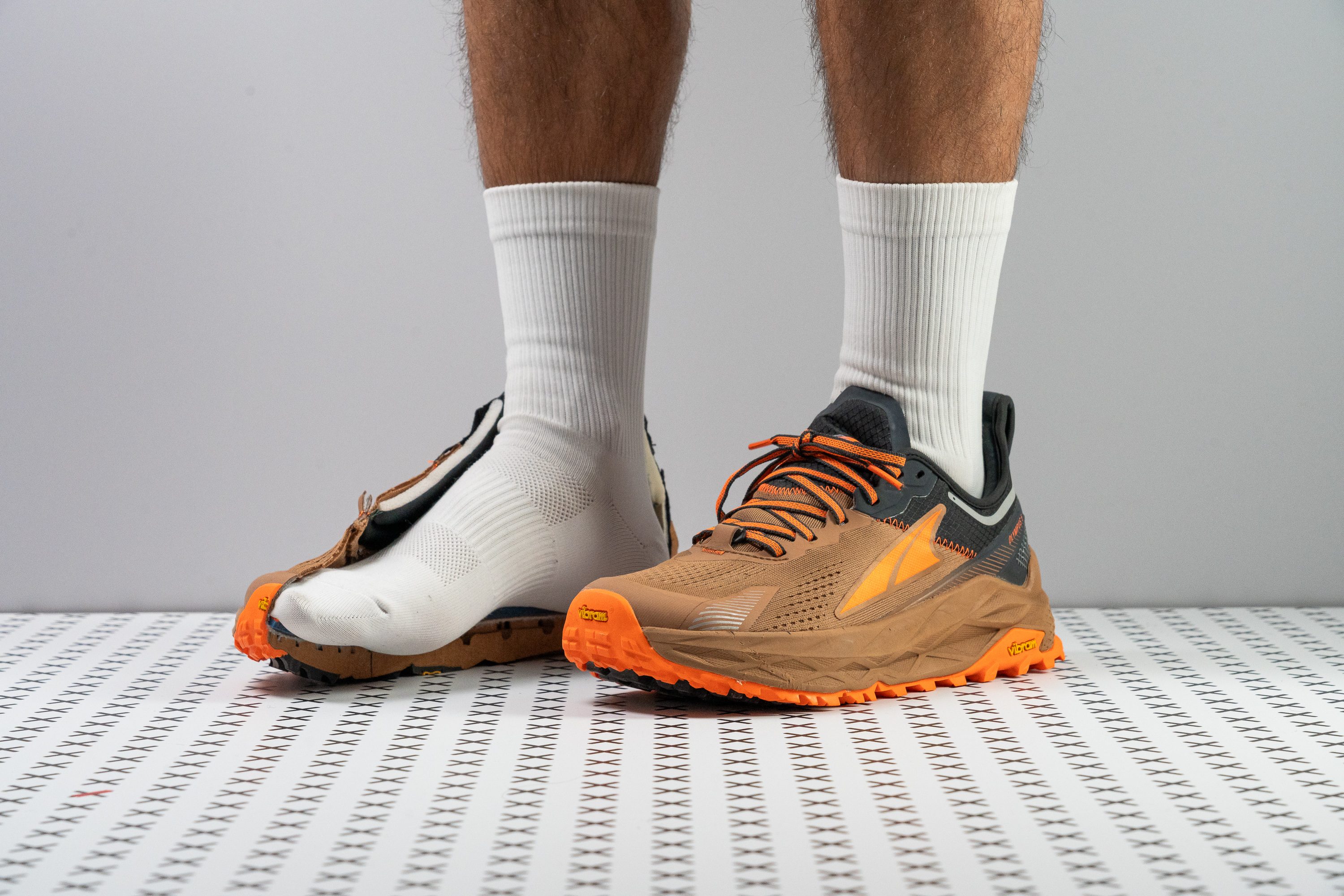































What makes it the best?
The Altra Olympus 5 is one of the best zero-drop trail shoes money can buy, with its supreme cushioning in the forefoot as well as the heel, and its impressive grip on wet and dry surfaces. Add its excellent energy return to the equation, and it easily takes the cake as our top zero-drop trail shoe.
The Olympus 5's outsole has an outstanding grip that inspires a lot of confidence and security with each step. Whether we were running on wet or dry trails, the outsole did its job and stuck to the surface.
The shoe also absolutely crushes it in the cushioning department. Its heel stack is 2 mm taller than the average trail shoe, while the forefoot is a massive 6.1 mm taller. That ample amount of foam helps keep our legs well-protected on the trails. Meanwhile, the midsole is 21% softer than the average, providing a magnificently comfortable experience even on long-distance treks.
More than being soft and comfy, that midsole is also quite responsive. We felt that it had a lot of energy return, which added more excitement to our runs.
However, the Olympus 5 is quite a heavy shoe at 11.46 oz (325g), which is 10% heavier than the average trail shoe. So those looking for a more lightweight trail shoe should consider other options.
Pros
- Grippy on wet and dry trails
- Protective muscles
- Comfort is a 10/10
- Toe box welcomes wide feet
- Gives out energy
- Breathable
- Stable ride
- Heel lockdown is terrific!
- Easy on and off
Cons
- Durability couldn't be worse
- Annoying lace bites
- It's a splurge
Best zero-drop trail running shoes
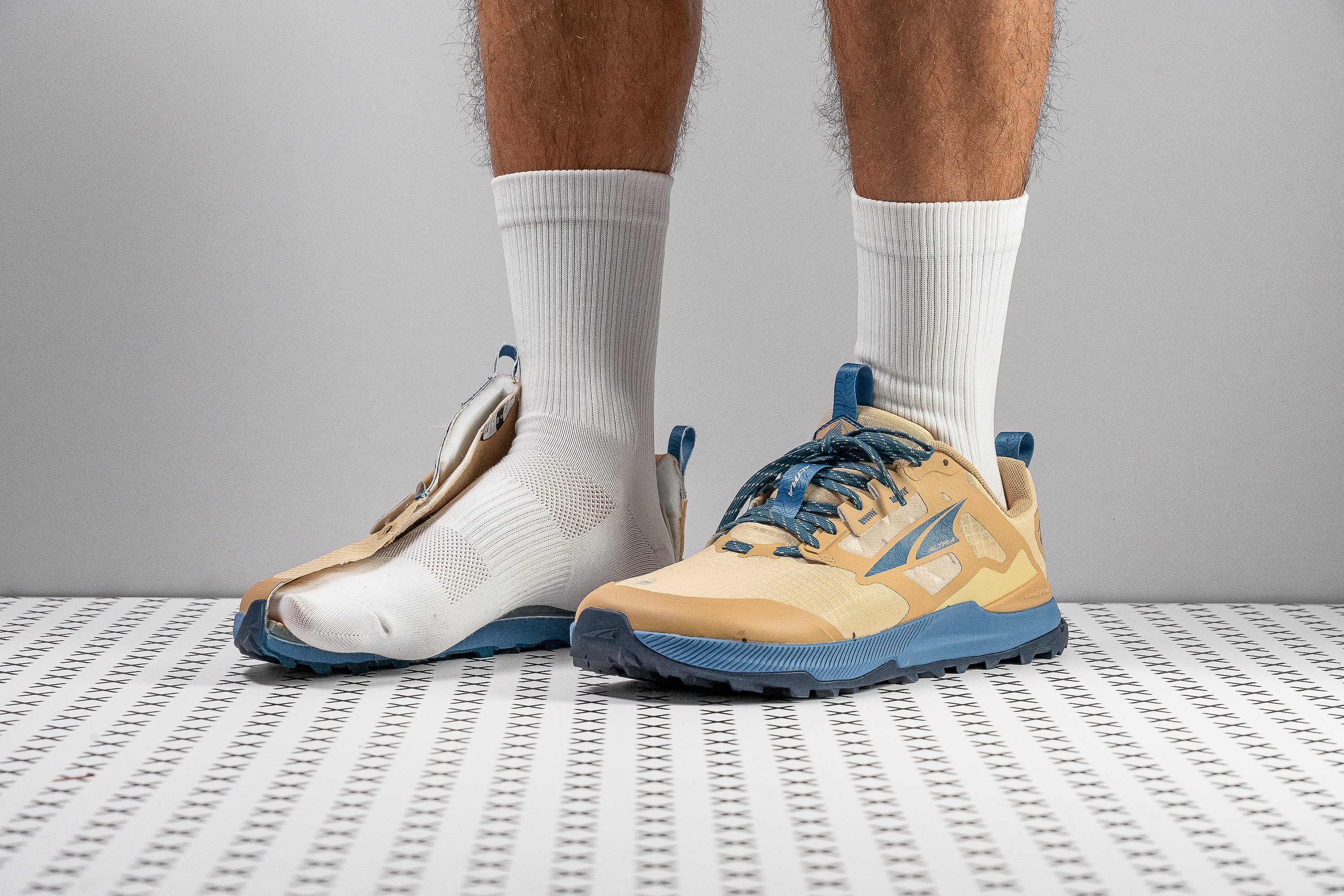











































What makes it the best?
Among all the shoes we lab-tested and ran in, Lone Peak 8 won us over with its flexible midsole, intuitive ride, and stability. As our top zero-drop trail shoe, it tackles mixed terrains with ease and control.
Navigating through unpredictable grounds feels like a breeze as the fluid midsole promotes quick and agile movements, adapting easily to our strides with less resistance. Our bend test confirms that it’s 27.1% more flexible than average. To ensure surefootedness, LP8 has 3.0-mm chevron-shaped lugs that grip excellently in dry conditions.
LP8 maintains a below-average 22.7/21.3 mm cushion, which leads to a barely-there 1.4 mm drop. This low and leveled profile promotes a more natural running feel with well-planted feet and fewer ankle rolls. We have high ground sensitivity while having enough impact and debris protection underfoot. Our durometer confirms the foam is 11.4% firmer than average, boosting both stability and a nice spring in our runs.
The wide, squared toebox follows our natural foot shape to enhance comfort and stability upon landing. The big toe area only tapers by 5.9% vs. the 20.5% average.
A weak point we found is the underwhelming traction of LP8 on wet and muddy terrains. We recommend sticking to dry surfaces for a safer running experience.
Pros
- Responsive midsole
- Natural barefoot feeling ride
- Low to the ground and stable
- Doubles as a reliable hiking shoe
- Breathable and durable ripstop upper mesh
- Secure midfoot lockdown
- Accommodating toebox
- Generously padded and comfy
- Dries quickly
- Gaiter attachment ready
Cons
- Not so grippy in wet conditions
- Subpar outsole durability
Caution! Read this before buying zero-drop running shoes
This section is written specifically for runners who are looking into zero-drop running shoes for the first time. This means you have never used zero-drop shoes and are considering them now.
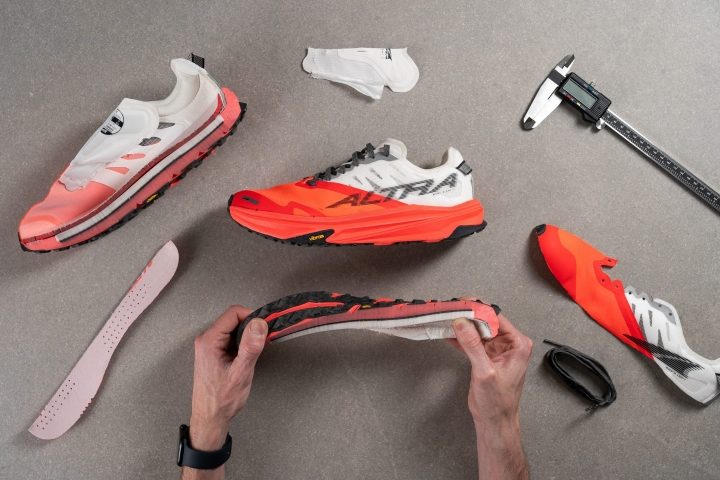
What you must know:
- It is never advisable to suddenly change from a high drop to a low drop, especially to the zero drop. Because of that, we recommend that you first look at the drop of your current running shoes or other footwear. If not zero drop or very low drop (up to 2-3 mm), the general recommendation is to transition to the zero-drop gradually.
- Zero-drop shoes can be minimalist or barefoot, but not necessarily. If this is your first time dealing with zero-drop shoes, consider trying the zero-drop shoes first and then going for the “extreme” of being barefoot or minimalist. This means you should look for some cushioning and not go for the very flat and low-to-the-ground shoes.
- Zero-drop shoes with minimal cushioning can be painful, especially if you’re a heel striker or if you haven’t transitioned to the zero-drop gradually. It is also said that the low-drop and zero-drop shoes promote forefoot strike more. Keep this in mind if you’re a heavy heel striker as these shoes might alter your stride and strike.
We have covered all of these challenges, pros and cons of different heel drops, and cited many studies, in our Ultimate guide on heel to toe drop. We highly recommend you read it before adding shoes of various heel drops to your rotation.
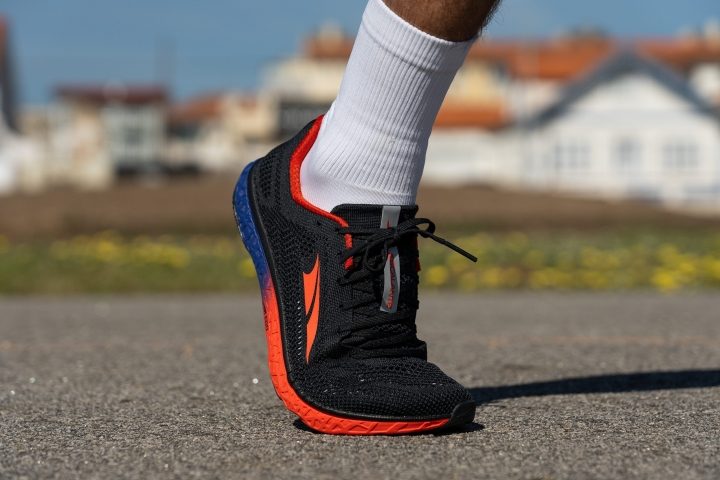
Know the difference: Zero drop vs. minimalist vs. barefoot
Minimalist running shoes have:
- Low heel drop
- Low stack heights
- High level of flexibility (both longitudinal and torsional)
- Light weight
- No stability features (they don’t help with stabilization or gait correction).
Overall, minimalist running shoes provide minimal interference with the natural movement of the feet. Here, you can actually calculate how minimalist (in %) running shoes that you’re using are.
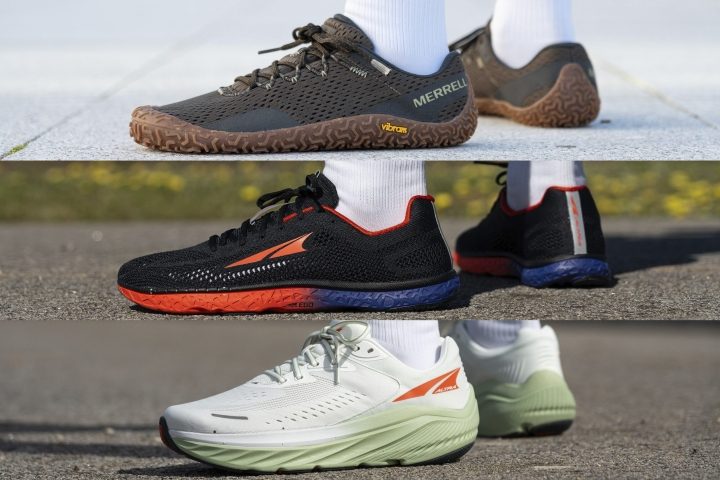
Barefoot running shoe (up), minimalist running shoe (middle), cushioned shoe (bottom); all 3 shoes are zero drop
Barefoot running shoes are minimalist running shoes that resemble that barefoot feel, which means they have a heel drop of 0 mm, are very low to the ground, and are insanely flexible.
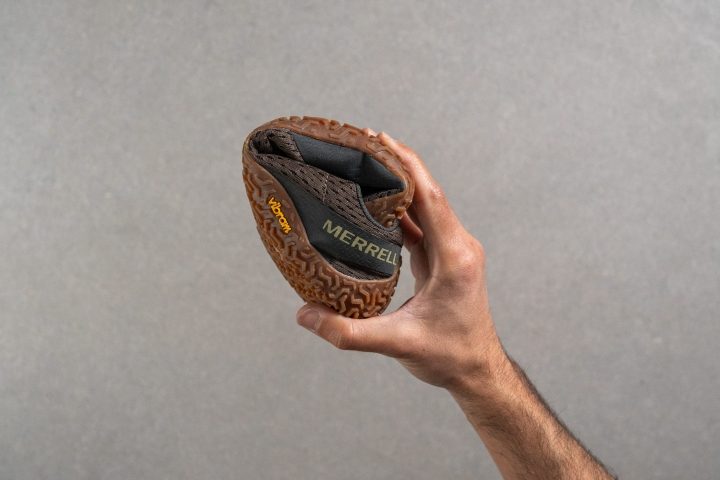
Flexibility of a barefoot (and minimalist) running shoe
Zero-drop shoes don’t have to be minimalist or barefoot. They only have a heel drop of 0 mm.
Official heel drop is often WRONG
Brands often add specifications to their shoes, like weight, stack heights, and heel drop. In our lab, we measure them all as well. What we found out is that the advertised heel drop is often wrong. While this is not such a big issue when the difference is small, say 1-2 mm, it can be a big issue when the difference is huge.
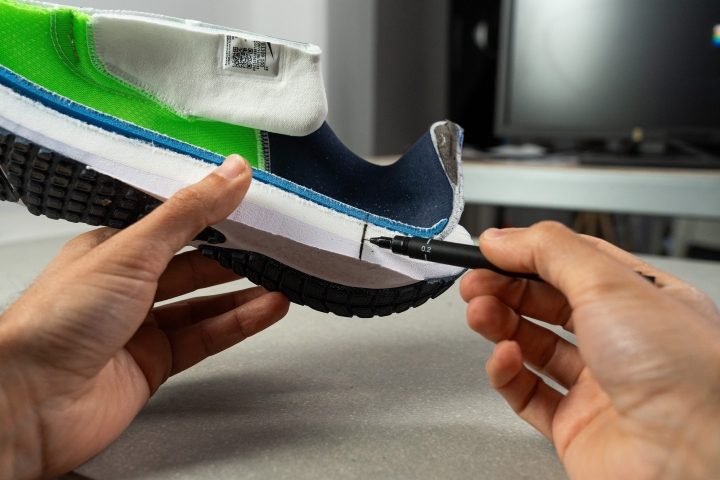
Marking the line where we measure the heel stack height
The trouble with the wrong heel drop is that you may buy a shoe with a low drop because you want to strengthen your feet, but you end up with a high-drop shoe that will actually make your hips work more. Or, you plan for a standard ~10mm drop because you’re a beginner but end up with a low-drop shoe that asks for a transition period. Best case scenario, these changes end up with some fatigue or a change in foot strike. Worst case scenario, you can get injured.
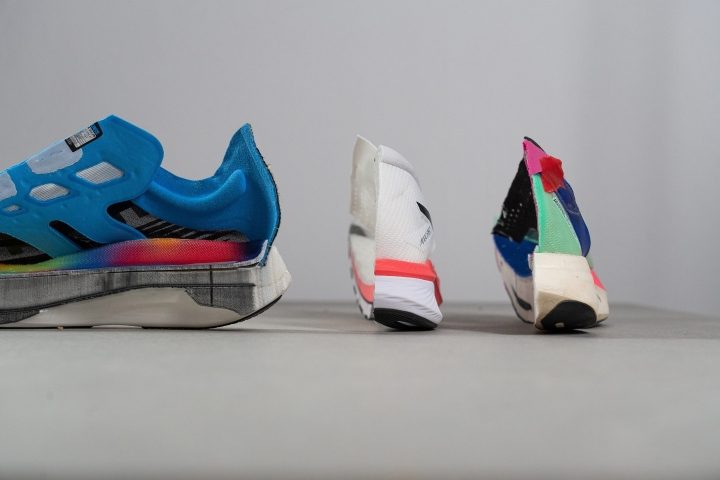
In the lab, we stick to the official guidelines of the World Athletics. We measure the forefoot stack height at 75% of the internal length of the shoe and the heel stack height at 12% of the internal length. These measurements are always taken at the center of the shoe, not closer to the sides.
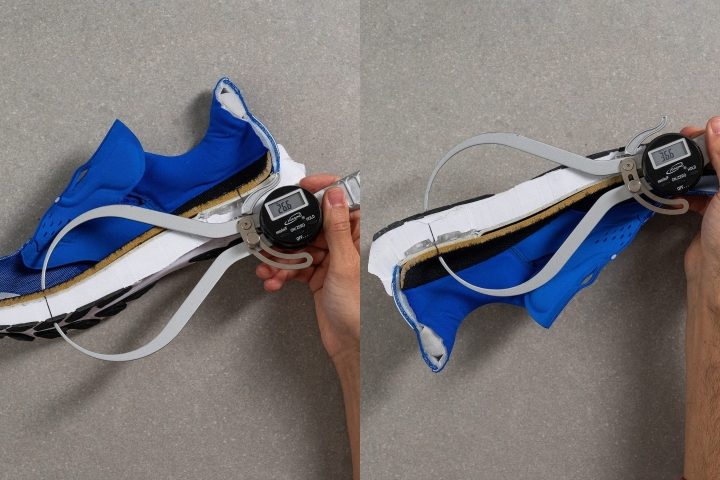
Stack height measurements: forefoot (left) and heel (right)
To achieve this, the running shoe must be cut in half. We, of course, do that as well. We then calculate the drop (heel stack minus forefoot stack).
Here are some of the biggest discrepancies in heel drop:
|
Shoe |
Brand (mm) |
RunRepeat (mm) |
Difference |
|
6 |
16.1 |
+168% |
|
|
5 |
11.1 |
+122% |
|
|
4 |
8 |
+100% |
|
|
5 |
2.7 |
-46% |
|
|
5 |
2.5 |
-50% |
|
|
8 |
3.3 |
-59% |
We have covered this topic in great detail in our guide How brands' heel-to-toe drop measurements differ from reality in running shoes.
When it comes to zero-drop shoes, we sometimes get a negative measurement or a drop that is different than a zero, but we think that is ok as long as the difference is not big.
Fortunately, in all our reviews you can find the exact drop measurement and rely on those numbers.
Ground feel in zero-drop running shoes
As mentioned above, when getting zero drop shoes, you can opt for:
- Not cushioned running shoes or barefoot running shoes. The midsole is very thin, you are very low to the ground, which means you can feel almost every little pebble, bump, or crack on the road/trail. This means that the ground feel is 10/10.
- Cushioned running shoes. Less ground feel and you get to enjoy a cushioned ride.
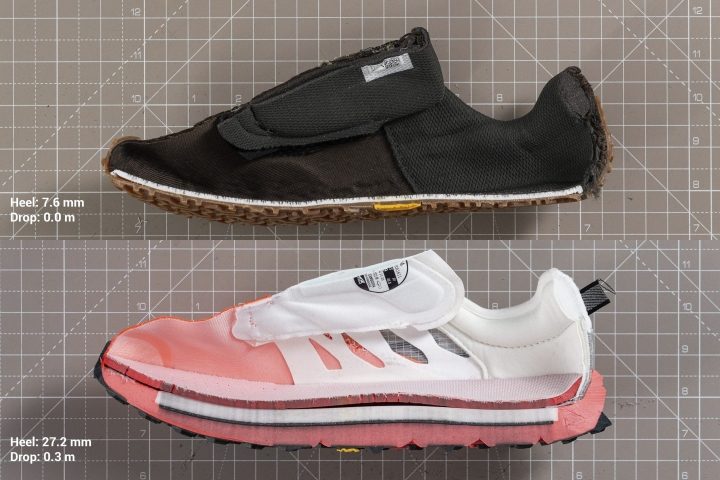
Zero drop shoes: minimalist (up) and cushioned (down)
As shown above, we measure the stack height in the lab, which is why it’s easy to choose from more or less cushioned zero-drop running shoes.
Foot-shaped zero drop running shoes
When diving into the zero-drop waters, it’s difficult not to mention the minimalist aspect, the barefoot aspect, and the foot-shaped toeboxes.
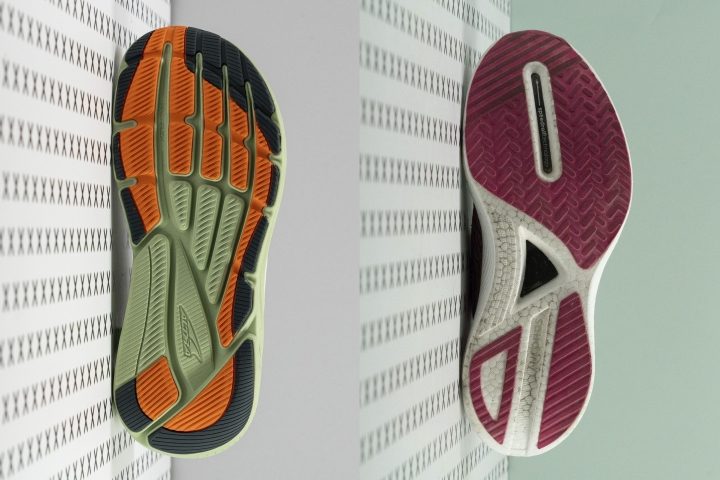
Foot-shaped outsole (left) vs. a common, pointy outsole (right)
Altra is known for zero-drop running shoes and for foot-shaped running shoes. Their toeboxes are wider than the average, with some being significantly wider than the average. It depends on the fit (they offer 3: Original, which is the widest; Standard, which is medium; and Slim, which is the narrowest). Just keep in mind that Altra’s Standard fit is much wider than the Medium (regular) in other brands.
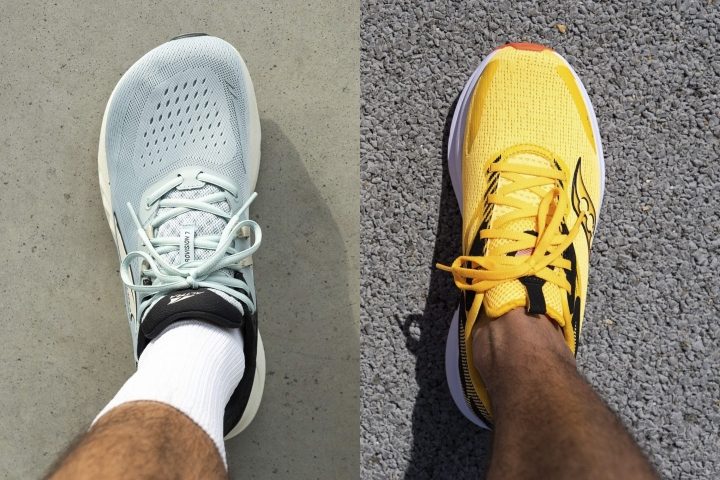
Looking at the foot-shaped Altra toebox (left) vs. a common, pointy toebox (left)
Although Altra trade-marked this shape, other minimalist and barefoot (also zero-drop) running shoes with wider toeboxes are available. This is because, as a part of the whole natural-running movement, toes are supposed to splay and not be cramped in the toeboxes.
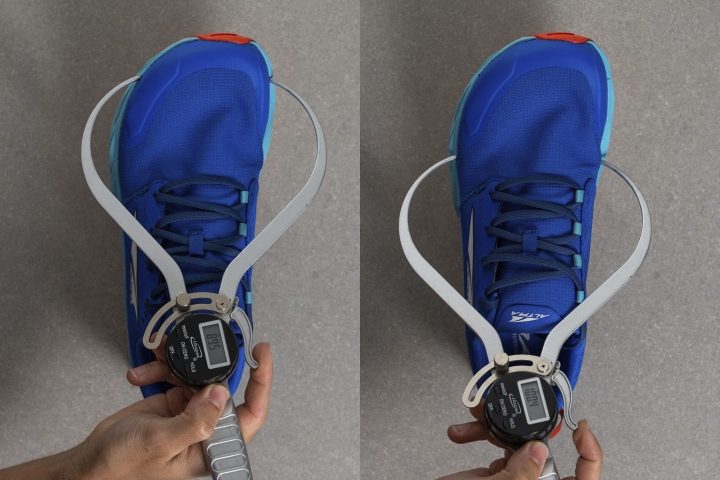
Measuring the width of the toebox on an Altra shoe
If you have such needs, do not worry, as we measure the width of the toebox in 2 places and have the lab data at your disposal. Check out below the list of the least pointy zero-drop running shoes.
How soft are zero drop running shoes?
The softness of the midsole plays a huge role in the overall comfort and performance. If you’re curious about different foams used in running shoes and their properties, we wholeheartedly recommend reading our ultimate guide on foams.
Showcasing the cushioning in a zero-drop Altra Paradigm 7
We measure the softness of the midsole with a shore A durometer.
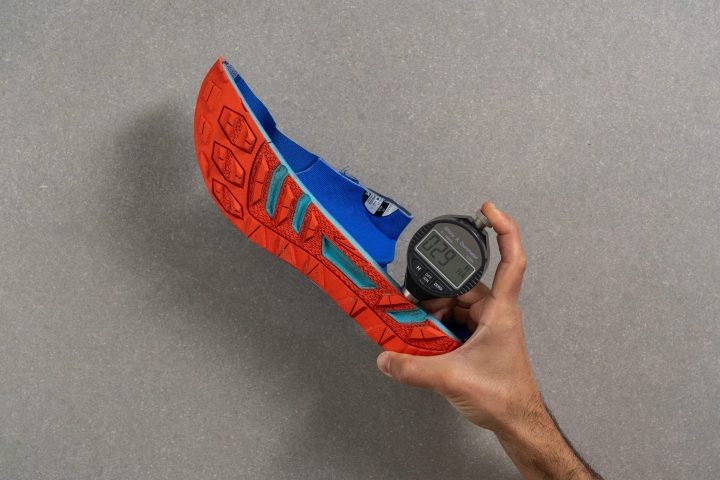
Measuring the softness of the midsole in RunRepeat lab
The lower the number on the durometer, the softer the midsole. In case you're very specific about this, we list both the firmest and the softest zero-drop shoes below (these lists are automatically updated as we publish new shoe reviews).
Flexibility of zero drop running shoes
When it comes to the flexibility of running shoes, we do the longitudinal and torsional test. For longitudinal flexibility, we clamp the forefoot to the table and bend the heel to 90 degrees using a digital force gauge. The bigger the number on the gauge, the more force we used = the stiffer the shoe.
Using a digital force gauge to measure the stiffness of a zero-drop running shoe
More flexible running shoes allow for a more natural movement. Stiffer shoes, on the other hand, offer more stability and can be snappier (especially when equipped with a carbon-fiber plate).
Assessing the torsional rigidity of a zero-drop running shoe in RunRepeat lab
When it comes to the torsional rigidity, we twist the shoe and assign it a 1-5 rating, where 5 is the most rigid. Rigid running shoes are great for trail runs, especially the ones on technical terrain or sections with large sharp rocks, where every bit of stability and protection matters.
When it comes to running shoes with a 0 mm drop, runners most often look for flexible shoes because zero drop is often related to more natural running and feeling the ground, and high levels of flexibility go hand in hand with that.
How durable are zero-drop running shoes?
Depends on whether they are made for road, trail, or both. And it depends on their design: cushioned or barefoot? Nevertheless, we test them all and log our data.
Testing the durability of the toebox in RunRepeat lab
In our shoe lab, we use a Dremel to test the durability of running shoes. We press it against the a) toebox b) heel padding and c) outsole. This allows us to understand how durable the shoes are in those 3 places.
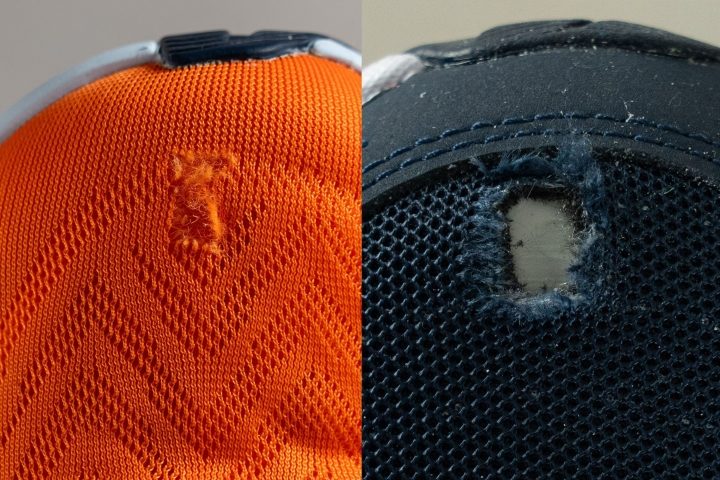
Different toebox damage levels present after the Dremel test
When testing the durability of the toebox and heel padding, we assess the damage on a 1-5 scale, where 5 is the most durable.
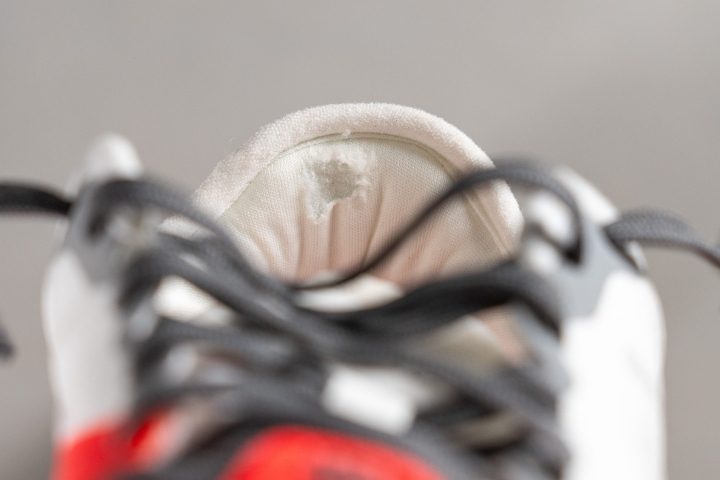
Heel padding damage visible during the durability test
But, when we test the outsole, we use a tire tread gauge. It allows us to measure the exact depth of the dent our Dremel has made.
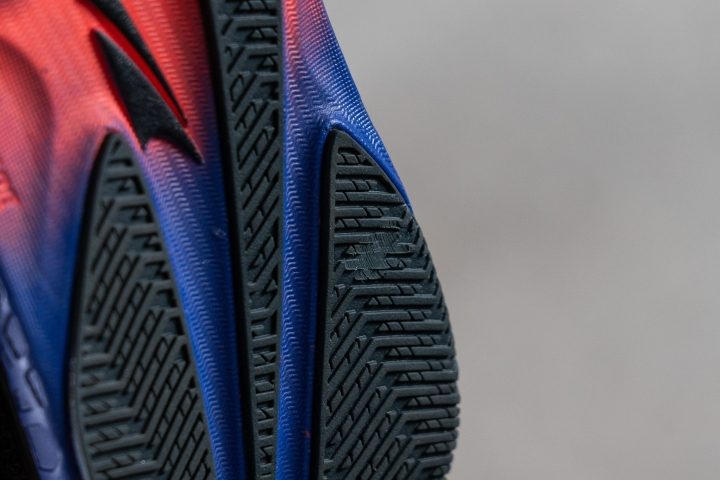
Outsole damage visible on a zero-drop running shoe during the durability test
The bigger the dent, the less durable the outsole.
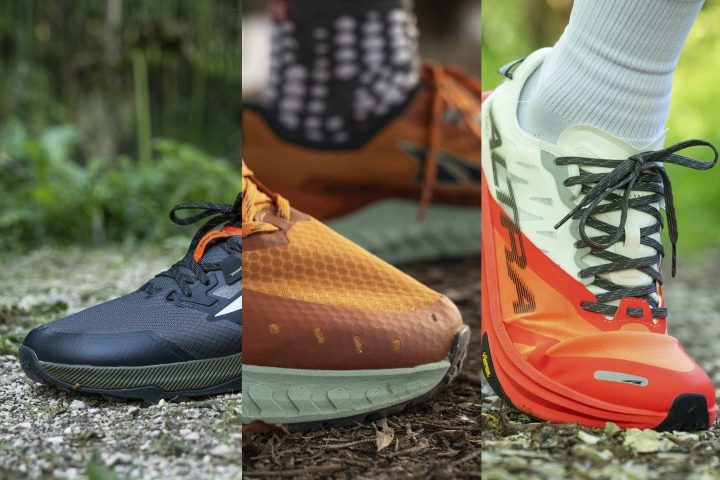
Toebox overlays in zero-drop trail running shoes
The durability of the toebox is, of course, more important in trail shoes than in road shoes.
How to transition to zero-drop running shoes
There isn’t one simple answer because how much time you’d need to do this depends on:
- Which shoes did you previously run in? How high is their heel drop and were they cushioned? It’s not the same to transition from 4 mm to 0mm or from 12 mm to 0 mm.
- Are you a heel striker? If yes, you might need more time to get used to the zero-drop shoes, especially if they are not cushioned enough at the heel to welcome your heel strike.
- Do you have any (past) injuries, and is there a reason you want to keep the load lower on certain parts of the legs?
- Which zero-drop shoes are you buying now: cushioned or not cushioned?
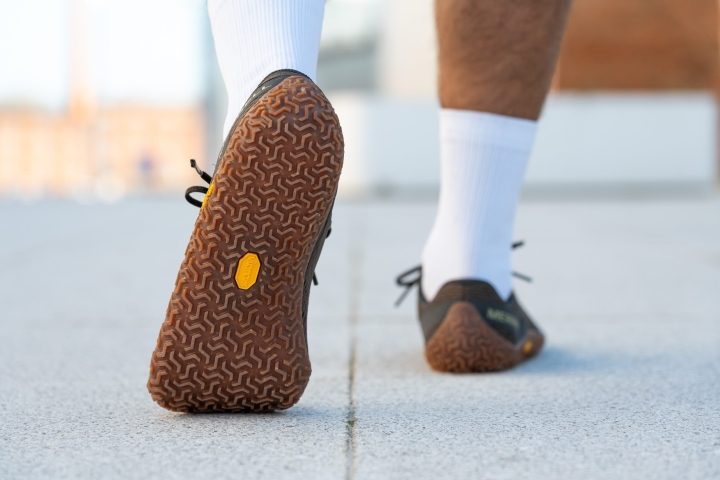
Here are a few tips on how to include the zero-drop running shoes in your rotation:
- Start slowly. The transition must be gradual. You can first use the shoes to just walk/hike in them and not immediately run. Short walks/hikes only.
- When you start running, do short, easy runs only at the beginning. A few miles, tops.
- Don’t run in zero-drop shoes every day. Start with a few times per week.
- If you feel pain, premature fatigue, or any straining, it is best to stop immediately. You might want to carry your ‘regular’ (higher-drop) running shoes in your backpack in case this happens so that you can get back home in shoes your legs are familiar with.
- Keep in mind that it can take up to half a year or a year to completely adjust to zero-drop running shoes (to be able to do a 10-mile run or so, not just the short one).
- If your feet are hurting in zero-drop shoes, consider adding exercises that strengthen your feet and calves to your weekly workouts.
Overall, it’s great to include different drops in your rotation because you get to strengthen different muscles in your legs. Just stay on the safe side and keep the transitions gradual!
